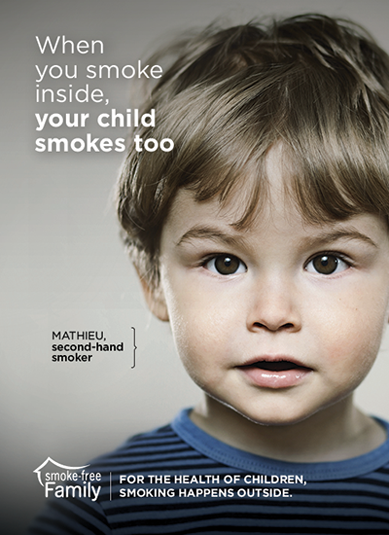
Montreal, October 20, 2014 – Back for an eighth year, the Smoke-Free Family campaign reminds people of the importance of smoking outside, far away from children, in order to protect their health. In Quebec, there are over 70,000 young “second-hand smokers”. By now, the dangers of second-hand smoke have been proven and documented, yet Quebec is still last by far in the country with respect to the protection of children against this toxic smoke. According to the most recent studies, twice as many Quebecers under the age of 12 are exposed to it as other Canadian children of the same age.
When their parents smoke at home or in the car, children smoke too, despite themselves. Children and even unborn babies who are exposed to cigarette smoke suffer direct consequences on their health.
“Children breathe more quickly than adults and their immune systems are not yet fully developed. This is why they are at greater risk of suffering from health problems when they are regularly exposed to second-hand smoke. Concretely, these health problems show up in my patients as asthma, pneumonia, colds and repeated ear infections.” explains Dr. Catherine Hervouet-Zeiber, pediatrician at the Centre hospitalier universitaire Sainte-Justine, and Smoke-Free Family spokesperson.
As for pregnant women exposed to second-hand smoke, they are at higher risk for miscarriage, premature delivery or complications at delivery. Unborn babies are not protected either: second-hand smoke can harm their growth and affect the development of their heart, lungs, nervous and digestive systems. Moreover, from the very first months of their lives, babies exposed to second-hand smoke run a greater risk of falling victim to sudden infant death syndrome.
“Children are mainly exposed to second-hand smoke at home. Even if most smokers make gestures to try to not inconvenience their loved ones with their cigarette smoke, there is no effective strategy to eliminate the toxic elements contained in this smoke from the air in the home. The only way to truly protect the health of children and to avoid making them second-hand smokers, is to go outside to smoke, far away from them!” says Dr. Hervouet-Zeiber.
1Dubé, G., Lavoie, A., Laprise, P. (2012). Enquête sur les habitudes tabagiques des Québécois : une étude portant sur des comportements méconnus face à un phénomène connu. Institut de la statistique du Québec.
2Institut national de santé publique du Québec (2014). Fumer dans la voiture en présence d’enfants: comportements de fumeurs québécois et croyances au sujet d’une éventuelle loi, p. 12. http://www.inspq.qc.ca/pdf/publications/1884_Fumer_Voiture_Enfants.pdf
Smoke-Free Family is an initiative by Capsana, a social enterprise entirely dedicated to the promotion of health and healthy lifestyles, as well as to the prevention and management of chronic illnesses. This campaign is presented in partnership with several public and private organizations, including Quebec’s ministère de la Santé et des Services sociaux, the public health departments of the agences de santé et des services sociaux du Québec, McNeil Consumer Healthcare and Uniprix. To learn more about the campaign and to obtain advice, visit the smokefreefamily.ca website or the facebook.com/smokefreefamily page.
For an interview with our spokesperson, Dr. Catherine Hervouet-Zeiber, please contact us.
Capsana is a social enterprise owned by the ÉPIC Foundation and the Fondation PSI, which are associated with the Montreal Heart Institute. Its mission is to help individuals take an active role in their health.
© 2026 Capsana – All rights reserved | Privacy policy | Sitemap